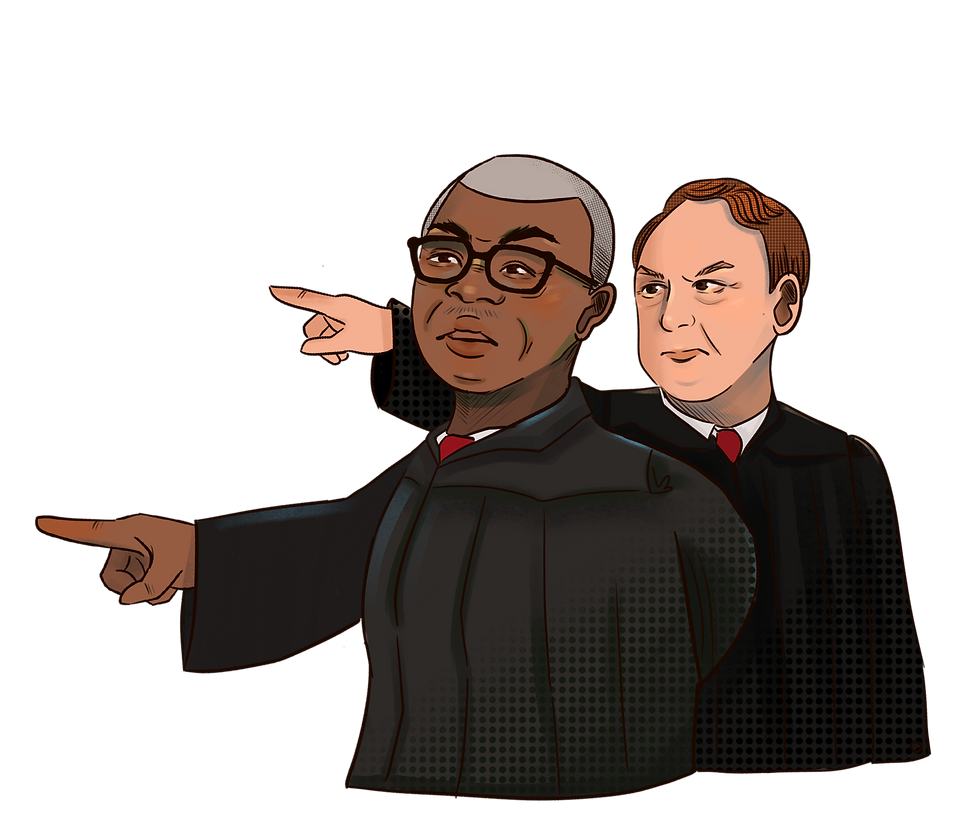Supreme Court adopts Code of Conduct
- Kyan Wang
- Dec 15, 2023
- 3 min read
By Eleanor Gil Dec. 14, 2023
On Nov. 13, the Supreme Court implemented a Code of Conduct in the wake of recently revealed scandals, such as undisclosed, fully paid vacations and bribery, on part of the justices. However, suspicions have arisen over how effective the code will be in preventing such scandals because the Supreme Court is responsible for enforcing the code on itself.

The main incentive behind creating the code is the cases of misconduct perpetrated by the chief justices themselves. For example, Justice Clarence Thomas has accepted hundreds of dollars’ worth of luxury vacations and real estate deals for over two decades from major GOP donor and Dallas billionaire Harlan Crow, as revealed by the nonprofit investigative journalism organization ProPublica. Furthermore, according to AP news, Justice Samuel Alito accepted a flight to Alaska in July 2008 aboard the private plane of two wealthy Republicans, one of whom has brought roughly a dozen cases before the court. During these cases, Alito did not recuse himself.

The code reaffirms and formalizes in one place the principles and ethics to which the justices claim they have long subscribed as members of the Supreme Court. The code builds upon existing anti-corruption laws and financial-disclosure requirements by outlining the protocol for ethically questionable contingencies—such as concealment of travel and hospitality by the Supreme Court justices—as cited by the Wall State Journal. However, the code is written in an extremely vague manner. For one, Canon 2 of the document states that justices are required to “avoid impropriety and the appearance of impropriety in all activities,” but there is no mention of enforcement mechanisms, and disclosures appear entirely voluntary. In fact, the Code does not properly outline the consequences of many ethical violations nor does it provide specific, consistent moral advice to justices and the public.
“As seen in the justices’ scandals, the Supreme Court has conclusively proven that it is unable to enforce a binding ethics code on themselves and adhere to it,” Sophomore Emily Moen said.
According to The Wall Street Journal, while many see the code of conduct as a crucial step toward reinforcing core values in the justice system such as equality and impartiality, others argue that further action must be taken to truly restore public trust in the Supreme Court, which has declined in recent years due to the conservative supermajority. Democrats have spearheaded efforts to establish more accountability in the Supreme Court, such as legislation that would fortify a formal recusal process and protocol for handling possible contingencies of impropriety. Democrats also consider calling on external parties (i.e. lawmakers) to make the Supreme Court adopt enforceable ethics rules. On the other hand, Republican Justice John Roberts defends the existing code, saying that the Supreme Court is so different from other federal courts that it would not make sense to simply adopt the same code applied to all other federal judges. According to NBC Nnews, Republicans also insist that Democrats’ efforts go beyond the matter of ethics and are only attempting to delegitimize a conservative court because both Justice Thomas and Alito are staunch conservatives.
“Although the Supreme Court at its current state does need more policing, the Court should not be restrained so extremely as to be deprived of their flexibility during ruling,” Senior Ethan Aji said.

As of late, the Supreme Court appears unfavorably partisan to the public, even more so with the malfeasance reports of sitting justices. A Marquette Law School Poll discovered that 59% of adults in the U.S. disapprove of the Supreme Court’s job, and the percentage is set to increase over the next few years. Consequently, with this public perspective in mind, the Supreme Court might have created the new code of conduct to appease the public. Nevertheless, it is still seen in a negative light as a shallow attempt to quell concerns regarding the misconduct of the justices.
About the Contributors

Eleanor Gil
staff writer
Eleanor Gil is currently a sophomore at Leland High and an enthusiastic writer for The Charger Account. She spends her free time cultivating her deep passions for environmental sustainability and renewable energy, neuroscience and psychology, the law, tennis, and viola.

Inseo Kim
art director
Inseo Kim is a senior and the art director for The Charger Account. She enjoys hanging out with friends and strong matcha ice cream.



















Comments